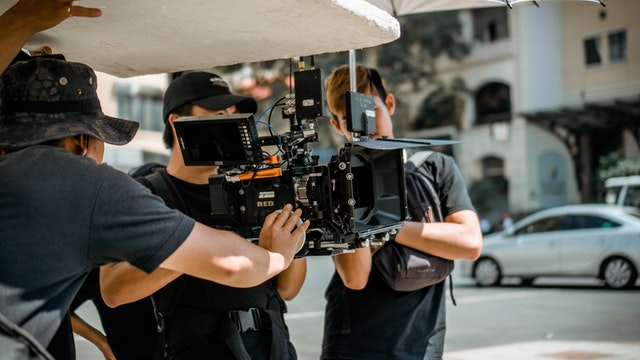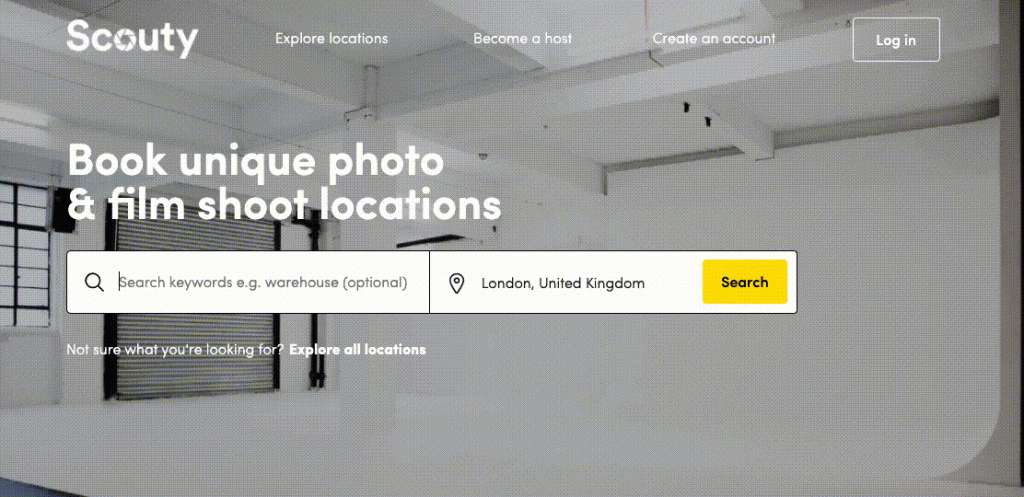Every film starts with pre-production, this is the stage where you write your script, source funding and organise your shoot. Film pre-production should be the longest stage in filmmaking. Get this part right, and you will save yourself both time and money. All film projects follow a similar workflow like the one we have broken down below.
One essential part of pre-production is finding the right locations. With Scouty, you can search hundreds of unique production spaces from period homes to stunning exteriors.
Screenwriting
Every filming project starts with an idea, then that idea is made into a screenplay. A film producer either finds a script, hires a writer, or adapts another piece of work. For example, a movie adaption of a novel, comic book or theatre play. The producer must own the original screenplay or have the right to make an adaptation.

This early stage is also called development. It typically involves the producer and screenwriter. However, the producer might hire the director and other above-the-line crew before film pre-production begins. It takes anywhere from a month to a year to lock a screenplay. During this time, the producer will consider how to finance the film and even create a distribution plan.
Budgeting
You will already have some idea of what kind of budget you need. Of course, specific genres will cost more than others, for example, a fantasy movie is more expensive than a rom-com. But you still need to know exactly what your budget is before finding funding. You do this by creating a script breakdown. This is when you go through all script scenes and note what you need to make each scene.

When you have a list of what you need to make your film, you can begin to make a budget estimate. When you have a budget, you can find and apply for funding. Films are funded through various sources, from crowdfunding to tax incentives. You will need to explore the best options to finance your movie. Although, most independent films are funded through a range of sources.
Casting Actors
You can cast your lead actors before you have all of your funding. This is because a well-known actor can actually motivate funding. Your script breakdown will let you know how many actors and extras you need. It might also be worth hiring a casting director to help you find the best talent for your production.

Casting is a process that happens throughout film pre-production. The lead actors are cast first, followed by supporting and then extras. It will help to know when and where you wish to shoot your film so that actors can get booked ahead of time.
Hiring Crew
You will hire a crew gradually throughout film pre-production. Your first staff will be the above-the-line crew, producer, screenwriter, director, DOP and production designer. Then, depending on the size of your project, a production management team will help you plan everything. This includes a line producer, 1st AD, coordinator and manager. You will also need a production office for people to work within.

Last hired will be your below-the-line crew, all other department heads and assistants. Some crew such as the costume designer, will need more prep time before filming begins. This will also be a good time to draw up contracts and negotiate pay rates. Your line producer is responsible for all below-the-line crew management.
Finding Filming Locations
Your film locations will play a big part in the look of your film. A location manager will search and find locations for all your films scenes. On Scouty, you can search hundreds of unique locations online, message hosts and book a date. In addition, there will be several meetings during film pre-production where all creative crew will discuss their vision for the film.

A location recce will also occur, where the creative and technical crew will check the site before filming. A location needs to look right and have the practicalities for working within. On large film sets, locations will be visited many times before they are confirmed and booked. Hiring locations will also make scheduling easier. You can start creating an initial filming plan now that you know location availability.
Storyboarding
Some directors find storyboarding helpful when visualising their films. However, storyboards are also needed for stunts, VFX and complex shots. A storyboard artist will help draw up boards, and depending on the genre of your film, you might need a concept artist. The director will work closely with the artists to create the film’s mood and vision.
Not all directors choose to storyboard, and they might prefer a shot list. On some productions, shots lists are essential as they help the 1st AD schedule each day. For example, you will need more time to film scenes with complex shots or many setups. This pre-visualisation also helps get everyone working with the same vision. All creative crew, costume, make-up, DOP and production designer need to work together.
Scheduling
At the end of film pre-production, you will lock a film schedule. You can create a plan with a simple stripboard schedule or with software. Many factors will affect this, from cast to locations and weather. What’s important is that you continue to update your schedule throughout production and let everyone know about any changes.
The last task in film pre-production is to create a call sheet. This document lets everyone know when and where they are needed each filming day. It also has lots of helpful information, such as an advanced schedule and risk assessments. So now you are ready to start production and shoot your film. Because you spent the time getting the planning stage right, your film shoot will run smoothly.
In Conclusion
Film pre-production is arguably the most crucial stage when making a film. This is where you plan your entire shoot and schedule as effectively as possible. If you don’t take your time during pre-production, you will harm your film shoot. That’s because a well-planned production will save time and money, and not to mention you will have a happier film set.
If you are looking for a location for your next creative project, Scouty can help you search hundreds of unique production spaces.

